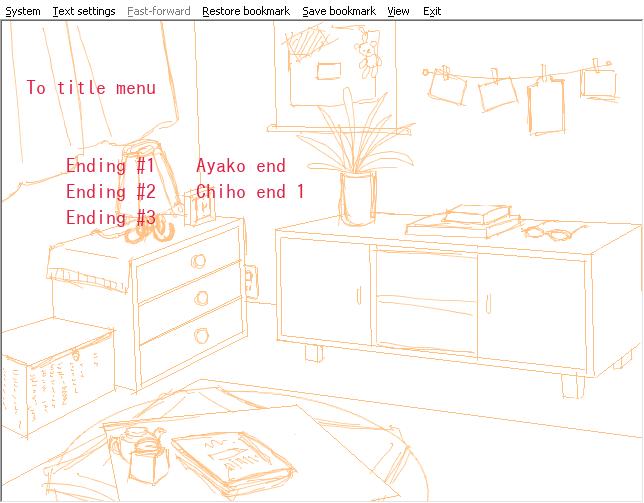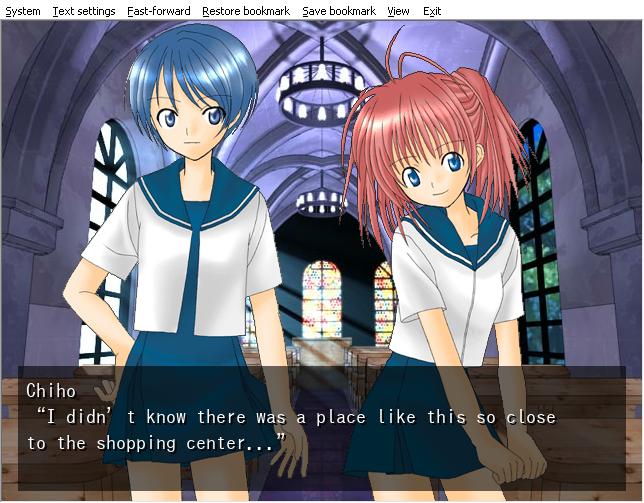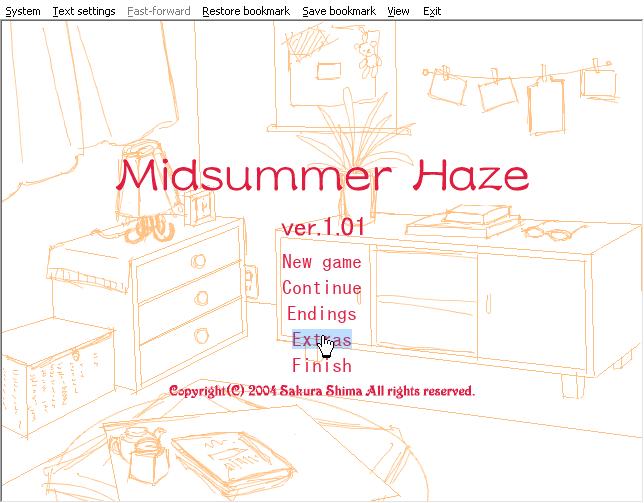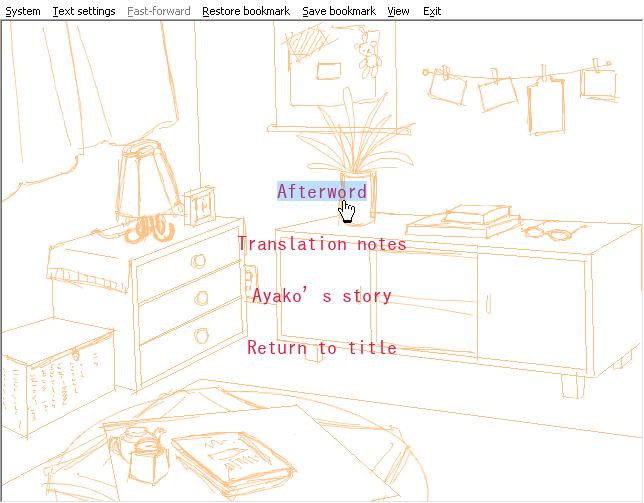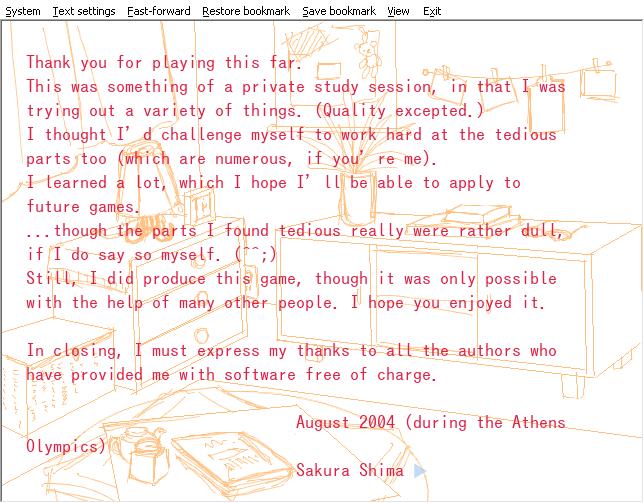I was recently given a reason to re-visit my review of a 2006 freeware visual novel localization called Midsummer Haze. My Midsummer Haze review came as part of my project to review 31 visual novels that were translated from Japanese to English for three “al|together festivals” which took place in 2005, 2006, and 2008. As I explained in a feature article, I was almost unable to play, much less review, Midsummer Haze, due to the fact that the English localization was a patch for the original Japanese executable and the original Japanese game appeared to have disappeared off the internet. Fortunately, I managed to find the executable and others have made it readily available so everyone can enjoy Midsummer Haze for themselves.
Of course, enjoy is relative here.
Midsummer Haze was memorable for me – albeit not for entirely good reasons. The novel itself is short and relatively innocuous but for one gimmick – its third and fourth of four endings are locked behind a random trigger. Specifically, in order to complete the novel, one has to keep going through one of its immediately available endings over and over until the third ending magically appears. It took me 43 tries the first time I read the novel and 19, 30, and 28 tries on my second, third, and fourth attempts. Not great, not the best. It was almost entirely thanks to the random trigger that I ranked Midsummer Haze last in my final al|together ranking (my opinion appears to be in line with the small crowd that took on the challenge).
But remembering Midsummer Haze made me remember something about the novel. Before we go there – allow me a brief digression. Back in June, I wrote an article about acquiring a Nintendo GameCube came called Harvest Moon: A Wonderful Life, what I am fairly confident was exactly 20 years to the day of the publication of my article. The main reason I could narrow down when I received that particular game 20 years after the fact is because I remembered the 2004 NBA Finals, which I subsequently wrote about in more detail, was going on at the same time. In that strange way – NBA basketball helped me remember when I received an engrossing (but not excessively addictive) video game about farming in a small village two decades ago.
At the time I sat down to write my Harvest Moon-NBA Finals article, I was not thinking about Midsummer Haze. But when I was prompted to think about Midsummer Haze just over one month later, I remembered a particular thing about it. One reward for banging one’s head against the wall to unlock Midsummer Haze’s third ending is an Afterword from the novel’s author, Sakura Shima. I sometimes remember peculiar things – for example roughly when I received Harvest Moon: A Wonderful Life in 2004. Another thing I remembered was that the afterword for Midsummer Haze included a reference to the 2004 Olympics. Since I had not only recently connected one of my own video game memories to a 2004 sporting event, but had also been reminded of Midsummer Haze during the 2024 Olympics, I decided that I should write a fun little afterword about Sakura Shima’s afterword.
I still have Midsummer Haze installed, so I launched it from Lutris and prepared to go to the exit menu. After all, I surely still had my save data from the last time I cleared the novel. Right?
(No.)
For whatever reason, I had the default title screen. I know that I cleared my old saves a couple of times so I could try to trigger the third ending starting from a clean slate (on the off chance that having already reached it once affected the odds), but I had apparently – for whatever reason – deleted my saves (or moved them – that is also possible) at some point after I last read the novel. This presented a problem: My article idea involves reading the Midsummer Haze afterword, but I did not have access to the afterword without clearing the game. What was I to do?
(Well, as an initial matter – I could have taken a closer look at my original Midsummer Haze review – which happens to include a screenshot of the afterword. But I did not do that. For whatever it is worth though, this project could benefit from a few additional captures – so no harm no foul.)
Against my better judgment, I decided to try to trigger the third ending again. The good thing about traumatic video game experiences is that they stay with you. For that reason, I fully remembered the steps for unlocking Midsummer Haze’s third ending off the top of my head. (I also remember the steps for the fourth ending – but that is not necessary for this project.) I first completed the first two endings: Ayako and Chiho 1. Chiho 1 is the ending one has to do over and over in the hope that Chiho 2 randomly occurs. I am actually not entirely sure whether the Ayako ending is a prerequisite to Chiho 2 occurring, but (A) I would guess it is and (B) I have no interest in trying to disprove my theory.
I then took a deep breath and started trying to trigger Chiho 2. The best way to do this is to create a save at the novel’s one choice point, choose to go to the bookstore, and then hit skip and quickly cut through the text.
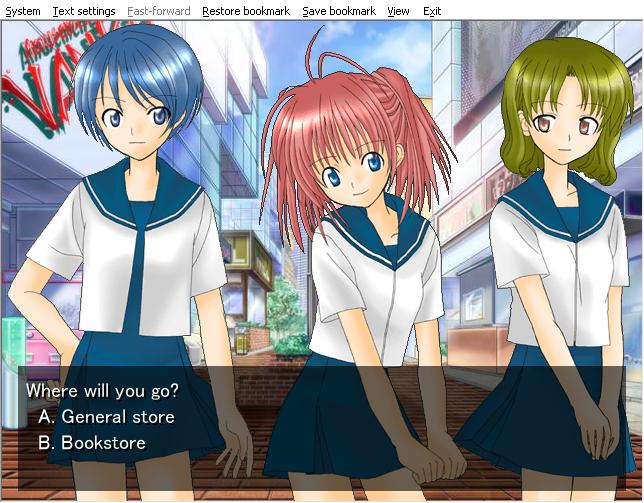
If one has not seen Chiho 2 on the save file in question, the skipping will stop when Chiho 2 triggers. If one has already seen Chiho 2, the text will keep skipping – so I recommend starting fresh if you are experimenting to see how many tries it takes. (Fun fact: Even if you see Chiho 2, there is no way to see it again other than doing Chiho 1 over and over and hoping for the best).
(Note: I wrote an endings guide for the perplexed.)
My first attempt at Chiho 1 did not bring about Chiho 2. Nor did the second, third, fourth, or fifth. I settled into the long haul and sighed when my sixth attempt also brought me to the premature ending credits instead of Chiho 2.
But then something amazing happened on my seventh try. Instead of skipping all the way through Chiho 1 to the credits, the text stopped skipping, and the scene changed.
I had triggered Chiho 2 in seven tries. All jokes aside – I am glad to see that it is at least possible to have some decent luck with the random trigger mechanic – and I have added a small update to my original review to note the development.
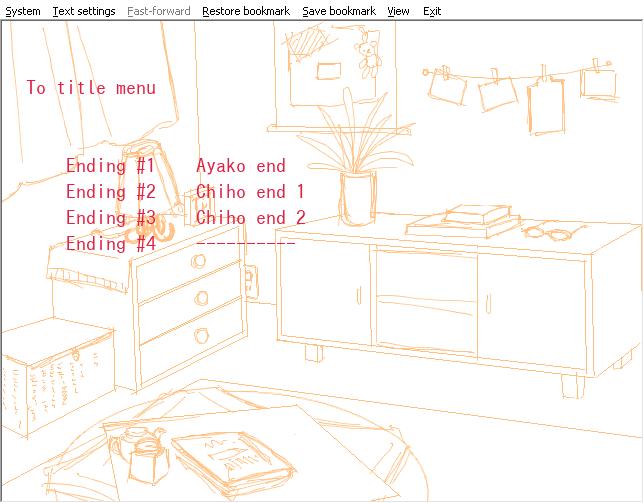
To be sure, I maintain that there is no real rhyme or reason for it – but having to skip through one ending 7 times to make it occur is certainly better than having to do it 19, 28, 30, or 43 times. I will venture 7 is on the very lucky end since none of the limited accounts I found when I reviewed the novel in the first instance had better luck than about 12 attempts. Midsummer Haze would have still ended up at the bottom of my al|together ranking for the mechanic if I had had good luck when I first tried it, but it probably would not have inspired multiple spinoff articles about less dramatic video game adventures in painful repetitiveness.
But I digress – this is not a re-review of Midsummer Haze, this is an article about the afterword. After completing the third of four endings, a new “Extras” item appears on the start menu.
After going into extras, we want to select the Afterword.
Now for the author’s Afterword:
Note the bottom of the afterword. Sakura Shima notes, right before signing the afterword, that he wrote it in “August 2004 (during the Athens Olympics).” We can take something interesting from this. The Athens Olympics ran from August 13 to 29 in 2004. According to Visual Novel Database, the Japanese game on which Midsummer Haze is based, Manatsu no Kagerou, was made available on August 23, 2004, which fell in the final week of the Athens Olympics. Assuming Sakura Shima actually wrote the afterword during the Olympics, we can infer that it was one of the last things – if not the last thing – he added to the novel, since I assume a first-time visual novel by a solo developer took a good amount longer than a week to make (the afterword itself suggests that it was a lengthy effort).
(Note: Midsummer Haze is likely mildly distinguishable from the original Manatsu no Kagerou in the sense that it also includes a translator’s note section in the Extras menu.)
In light of the fact that I was able to remember when I received a specific game 20 years ago by connecting it to an ongoing sporting event, I cannot help but wonder of Sakura Shima, wherever he may be, is reminded of all the time he spent developing Manatsu no Kagerou by news about the ongoing 2024 Olympics in Paris. I would not be surprised if this is the case since developing a visual novel for the first time is probably more memorable than receiving a video game.
While I stand by all of my criticism of Midsummer Haze as a visual novel – namely that it is unintentionally (I presume unintentionally from the author’s afterword) sadistic – I will leave with what will probably be my final detailed thoughts on the novel with a positive note. Sakura Shima wrote in the afterword before noting that he was writing during the Olympics:
There was something of a private study session, in that I was trying out a variety of things. (Quality excepted.) I thought I’d challenge myself to work hard at the tedious parts too (which are numerous, if you’re me).
Midsummer Haze includes two mechanics which are among the most interesting of al|together. The first is the infamous (in these pages, at least) random trigger for the third ending. The second is the trigger for the fourth and final ending, which can only be reached after clearing the third ending. It involves a hidden timer and I explain how it works in an off-site guide (the second mechanic is neat and I would have given it more critical praise had the random trigger not been a prerequisite). I dare say that only Crimsoness and Summer, Cicadas, and the Girl rival Midsummer Haze in mechanic creativity. While those two novels are admittedly much better pieces than Midsummer Haze, I respect the sentiment and work ethnic that must have gone into making Manatsu no Kagerou on Sakura Shima’s end and the effort of the translator to ensure that English readers can skip their way to a unique visual novel experience. Sakura Shima also wrote in the afterword that he learned quite a bit from making Midsummer Haze and hoped that he would be able to apply what he learned to future games. I know note of Sakura Shima continued making visual novels (Visual Novel Database does not list any additional credits), but I hope he did and was able to apply what he learned from his first effort to future works – perhaps with interesting mechanics that are less cruel to the reader.
